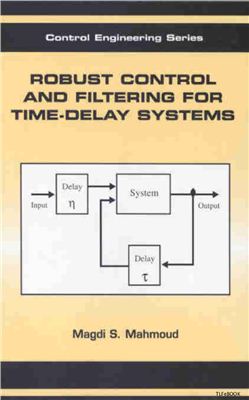Издательство Marcel Dekker, 2000, -448 pp.
In many physical, industrial and engineering systems, delays occur due to the finite capabilities of information processing and data transmission among various parts of the system. Delays could arise as well from inherent physical phenomena like mass transport flow or recycling. Also, they could be by-products of computational delays or could intentionally be introduced for some design consideration. Such delays could be constant or time-varying, known or unknown, deterministic or stochastic depending on the system under consideration. In all of these cases, the time-delay factors have, by and large, counteracting effects on the system behavior and most of the time lead to poor performance. Therefore, the subject of Time-Delay Systems (TDS) has been investigated as functional differential equations over the past three decades. This has occupied a separate discipline in mathematical sciences falling between differential and difference equations. For example, the books by Hale [l], Kolmanovskii and Myshkis [2], Gorecki et a1 [3] and Hale and Lune1 [4] provide modest coverage on the fundamental mathematical notions and concepts related to TDS; the book by Malek-Zavarei and Jamshidi [5] presents different topics of modeling and control related to TDS with constant delay and the book by Stepan [6] gives a good account of classical stability methods of TDS.
Due to the fact that almost all existing systems are subject to uncertainties, due to component aging, parameter variations or modeling errors, the concepts of robustness, robust performance and robust design have recently become common phrases in engineering literature and constitute integral part of control systems research. In tu, this has naturally brought into focus an important class of systems: Uncertain Time-Delay Systems (UTDS). During the last decade, we have witnessed increasingly growing interest on the subject of UTDS and numerous results have appeared in conferences and/or published in technical jouals. Apart from these scattered results and the volume edited very recently by Dugard and Verriest [7] however, there is no single book written exclusively on the analysis, design, filtering and control of uncertain time-delay systems. It is therefore believed that a book that aims at bridging this gap is certainly needed.
This book is about UTDS. It is directed towards providing a pool of methods and approaches that deal with uncertain time-delay systems, In SO doing, it is intended to familiarize the reader with various aspects of the control and filtering of different uncertain time-delay systems. This will range from linear to some classes of nonlinear, from continuous-time to discrete-time and from time-invariant to time-varying systems. Throughout the book, I have endeavored to stress mathematical formality in a way to spring intuitive understanding and to explain how things work. I hope that this approach will attract the attention of a wide spectrum of readership.
Introduction.
ROBUST CONTROL.
Robust Stability.
Robust Stabilization.
Robust H? Control.
Guaranteed Cost Control.
Passivity Analysis and Synthesis.
nterconnected Systems.
ROBUST FILTERING.
Robust Kalman Filtering.
Robust H? Filtering.
Interconnected Systems.
In many physical, industrial and engineering systems, delays occur due to the finite capabilities of information processing and data transmission among various parts of the system. Delays could arise as well from inherent physical phenomena like mass transport flow or recycling. Also, they could be by-products of computational delays or could intentionally be introduced for some design consideration. Such delays could be constant or time-varying, known or unknown, deterministic or stochastic depending on the system under consideration. In all of these cases, the time-delay factors have, by and large, counteracting effects on the system behavior and most of the time lead to poor performance. Therefore, the subject of Time-Delay Systems (TDS) has been investigated as functional differential equations over the past three decades. This has occupied a separate discipline in mathematical sciences falling between differential and difference equations. For example, the books by Hale [l], Kolmanovskii and Myshkis [2], Gorecki et a1 [3] and Hale and Lune1 [4] provide modest coverage on the fundamental mathematical notions and concepts related to TDS; the book by Malek-Zavarei and Jamshidi [5] presents different topics of modeling and control related to TDS with constant delay and the book by Stepan [6] gives a good account of classical stability methods of TDS.
Due to the fact that almost all existing systems are subject to uncertainties, due to component aging, parameter variations or modeling errors, the concepts of robustness, robust performance and robust design have recently become common phrases in engineering literature and constitute integral part of control systems research. In tu, this has naturally brought into focus an important class of systems: Uncertain Time-Delay Systems (UTDS). During the last decade, we have witnessed increasingly growing interest on the subject of UTDS and numerous results have appeared in conferences and/or published in technical jouals. Apart from these scattered results and the volume edited very recently by Dugard and Verriest [7] however, there is no single book written exclusively on the analysis, design, filtering and control of uncertain time-delay systems. It is therefore believed that a book that aims at bridging this gap is certainly needed.
This book is about UTDS. It is directed towards providing a pool of methods and approaches that deal with uncertain time-delay systems, In SO doing, it is intended to familiarize the reader with various aspects of the control and filtering of different uncertain time-delay systems. This will range from linear to some classes of nonlinear, from continuous-time to discrete-time and from time-invariant to time-varying systems. Throughout the book, I have endeavored to stress mathematical formality in a way to spring intuitive understanding and to explain how things work. I hope that this approach will attract the attention of a wide spectrum of readership.
Introduction.
ROBUST CONTROL.
Robust Stability.
Robust Stabilization.
Robust H? Control.
Guaranteed Cost Control.
Passivity Analysis and Synthesis.
nterconnected Systems.
ROBUST FILTERING.
Robust Kalman Filtering.
Robust H? Filtering.
Interconnected Systems.

